A deep dive into how biblical farming narratives sow seeds of wisdom, nurturing spiritual growth and timeless lessons for modern life.
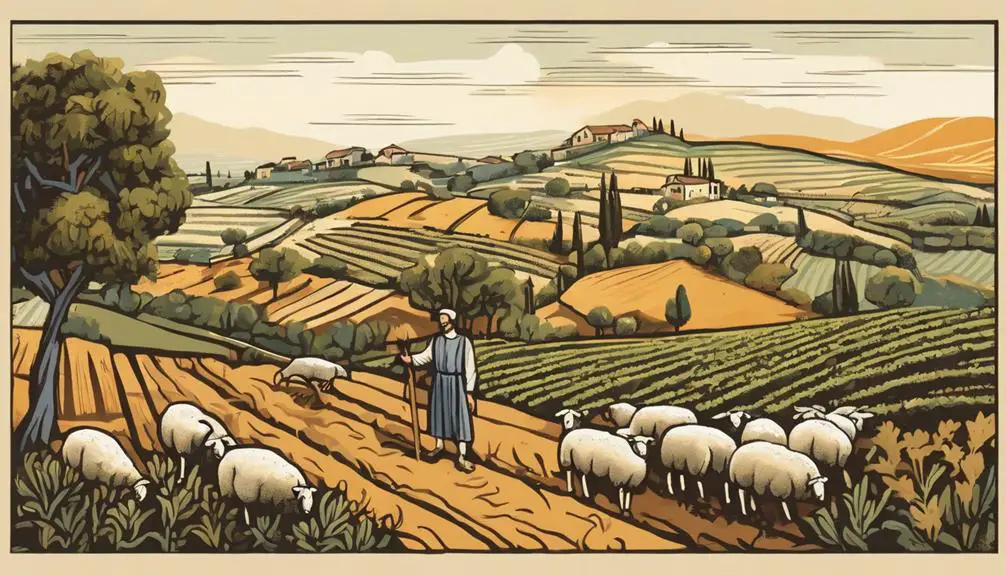
Farming in the Bible
As you sow, so shall you reap. This adage not only holds true in life but also weaves through the fabric of biblical narratives, where farming is more than just tilling the land; it's a metaphor for spiritual growth and sustenance.
You'll find that agriculture in the Bible isn't merely about historical cultivation practices but encompasses profound lessons in responsibility, stewardship, and faith. From the Garden of Eden to the Parables of Sowing and Reaping, the soil of Scripture is fertile with stories that resonate with our deepest sense of being.
Why do vineyards and harvest festivals feature so prominently, and what can they teach us today? Let's explore the layers of meaning these agricultural references hold, unearthing insights that remain relevant in our modern lives.
Key Takeaways
- Farming is depicted in the Bible as a divine mandate for stewardship and care for the earth.
- Biblical texts embed ethical and spiritual principles in agricultural laws to promote justice and sustainability.
- Parables related to farming convey deeper spiritual meanings, emphasizing growth, patience, and divine oversight.
- Celebrations and festivals in the Bible underscore a communal gratitude for harvests and the blessings of the land.
The Garden of Eden: Agriculture's Origin

The Garden of Eden, often regarded as the cradle of agriculture, presents a foundational narrative that intertwines spiritual significance with the dawn of human cultivation practices. This sacred story not only illustrates humanity's first encounter with farming but also embeds profound layers of Eden's symbolism within its context. You're invited to explore how this symbolism reflects the broader themes of divine stewardship and humanity's role in the natural world.
Delving deeper, Eden symbolizes a harmonious existence between humans and the Earth, underlining the concept of divine stewardship. This stewardship implies a responsibility bestowed upon humanity to care for the land, an idea that transcends mere agricultural activity to encompass a spiritual mandate. It's essential to recognize how this narrative positions humans as caretakers rather than exploiters, suggesting that the act of cultivation should be carried out with respect and mindfulness towards creation.
In this light, Eden's story isn't just about the origin of agriculture but also about establishing a model for responsible stewardship. It encourages you to reflect on the sacredness of the earth and the importance of nurturing the land with a sense of divine purpose and respect. This interpretation redefines our understanding of agriculture from mere survival to a spiritually enriched practice.
Agricultural Laws in Leviticus
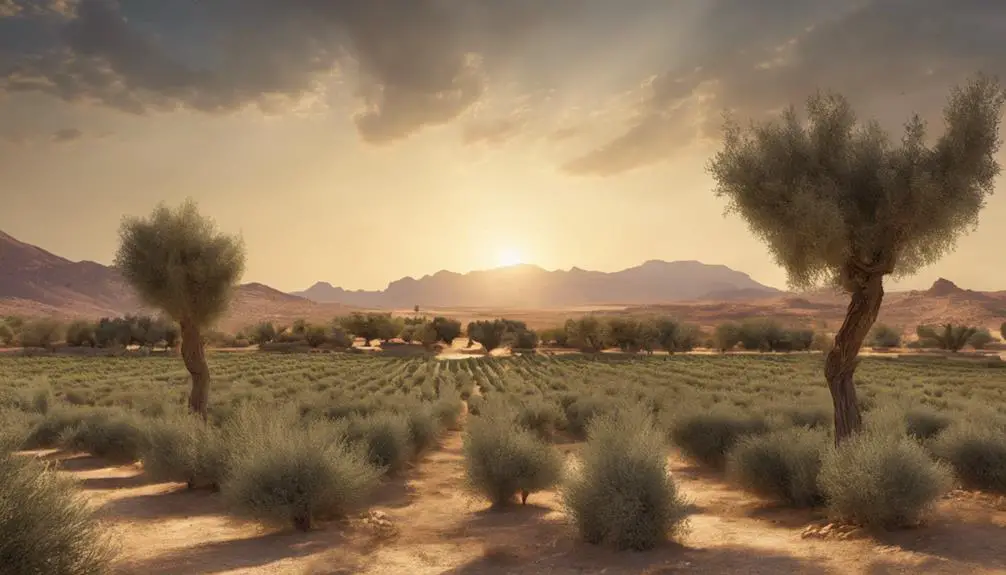
In Leviticus, you'll find a comprehensive framework of agricultural laws that not only governed ancient farming practices but also embedded deep ethical and spiritual principles within the fabric of daily life. These statutes, particularly the concepts of Land Sabbaths and the Jubilee Year, underscored a profound respect for the land and a commitment to social equity and environmental stewardship.
Every seventh year, the Land Sabbath commanded a cessation of all agricultural activity. This practice allowed the land to rest and rejuvenate, a principle that modern sustainable farming echoes. The Jubilee Year, observed every 50th year, further extended these values by promoting economic redistribution and the liberation of indentured servants. It mandated the return of leased or sold land to its original families, ensuring that wealth and resources didn't concentrate indefinitely in the hands of a few.
These Levitical laws served as a constant reminder of the interconnectedness of society, economy, and the environment. They encouraged a communal responsibility towards the less fortunate and a sustainable approach to resource management, principles that remain remarkably relevant in today's world.
Parables of Sowing and Reaping
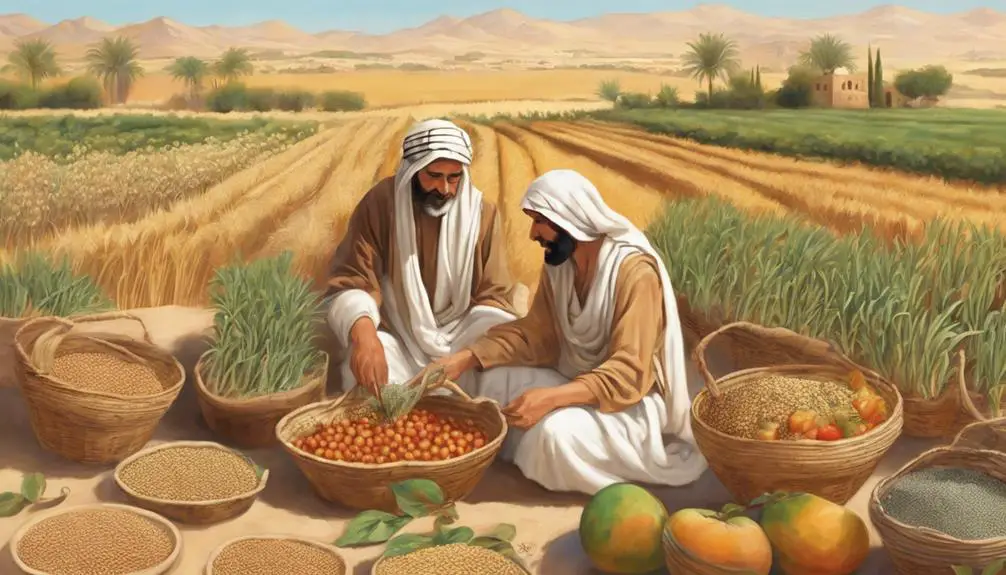
Delving into the parables of sowing and reaping, you'll uncover layers of spiritual and moral teachings that transcend mere agricultural practices, offering profound insights into human behavior and divine principles. These stories, while rooted in the agrarian culture of their time, serve as metaphors for spiritual growth and life lessons, encapsulating the essence of human existence and the pursuit of righteousness.
- *The Parable of the Sower* illustrates the importance of preparing one's heart, likening it to soil, to receive and nurture the word of God for spiritual growth.
- *The Parable of the Weeds among the Wheat* teaches about the coexistence of good and evil in the world, emphasizing patience and divine judgment.
- *The Parable of the Mustard Seed* symbolizes the kingdom of Heaven's humble beginnings and its expansive growth, encouraging faith in small beginnings.
- *The Parable of the Growing Seed* highlights the mysterious, self-sustaining power of the Kingdom of God, reflecting on the process of spiritual maturation.
These parables, rich in agricultural imagery, aren't just about farming but are deeply interwoven with the fabric of spiritual and moral life, offering timeless wisdom on persistence, faith, and the human condition.
The Role of Vineyards and Wine
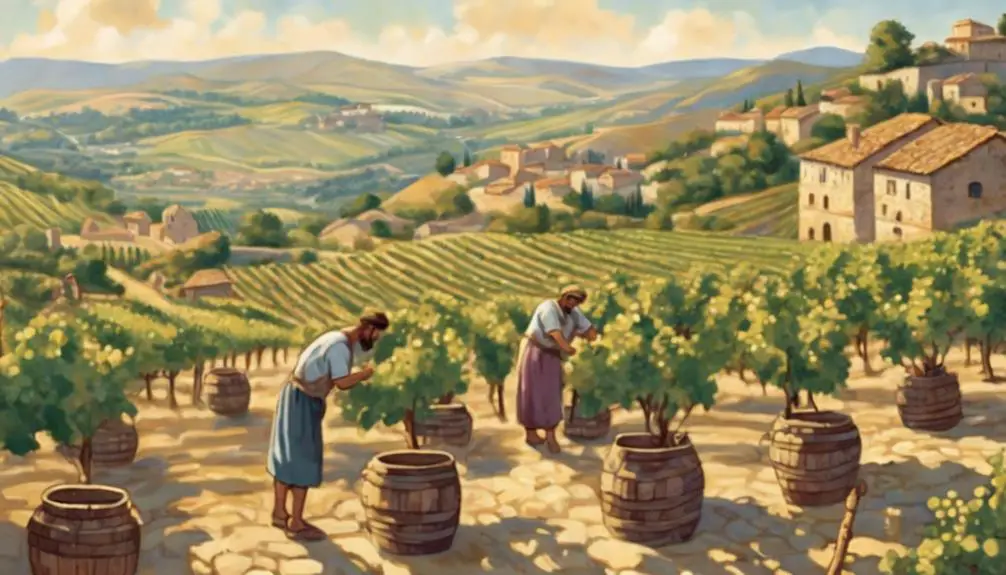
Shifting focus to vineyards and wine, it's evident that these elements also hold significant spiritual and cultural implications within biblical narratives, symbolizing prosperity, celebration, and divine blessing. Wine symbolism is deeply ingrained in the fabric of these stories, serving as a metaphor for joy, abundance, and the blessings of God. It's not merely a product of fermentation but a testament to the divine favor and the richness of the land.
Vineyard management, as depicted in the Bible, reflects not only agricultural practices but also moral and spiritual teachings. The care and dedication required in cultivating a vineyard parallel the diligence and faithfulness expected in one's spiritual life. This analogy underscores the importance of nurturing growth and bearing fruit, both in the literal and metaphorical sense.
Furthermore, the meticulous attention to vineyard management in biblical times highlights the value placed on stewardship of the land and resources. It's a reminder that prosperity and blessings aren't solely for personal enjoyment but are gifts from God, meant to be shared and celebrated within the community. In this context, wine becomes more than just a beverage; it's a symbol of communal bonds and divine grace, woven intricately into the social and spiritual fabric of biblical times.
Harvest Festivals and Celebrations
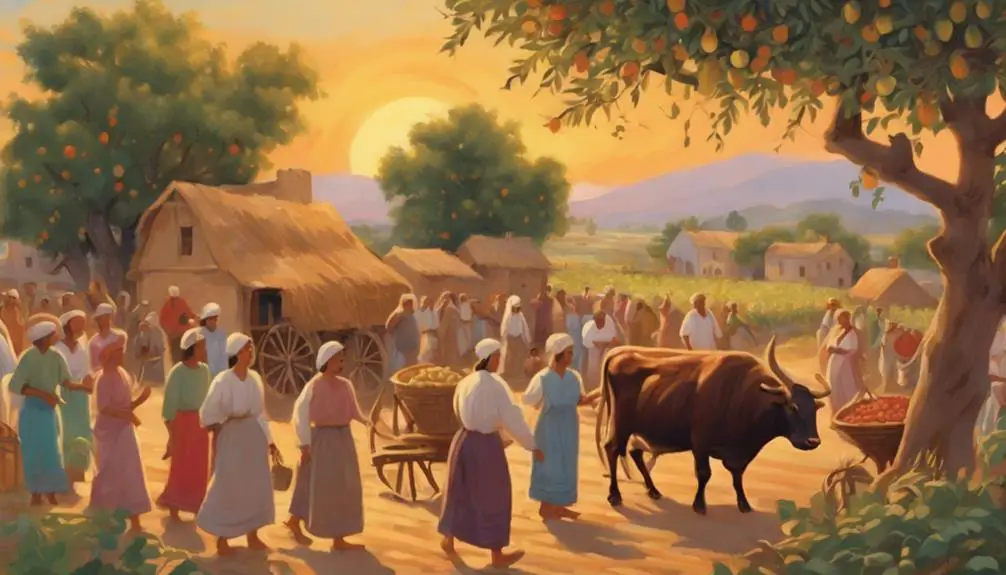
Harvest festivals and celebrations, deeply entrenched in biblical tradition, serve as vibrant expressions of gratitude and communal unity for the bounty provided by the land. These events aren't merely social gatherings but are steeped in religious and cultural significance, reflecting the deep symbiosis between the people and their environment.
Understanding the feast significance and seasonal rituals associated with these celebrations provides a rich insight into biblical agrarian society. These festivals, outlined in the Bible, are:
- Passover and the Feast of Unleavened Bread: Celebrating the beginning of the harvest and commemorating the Israelites' exodus from Egypt.
- Feast of Weeks (Shavuot or Pentecost): Marking the end of the wheat harvest.
- Feast of Booths (Sukkot): A thanksgiving for the fruit harvest.
- New Year for Trees (Tu B'Shvat): Recognizing the season when the earliest-blooming trees in the Holy Land emerge from their winter sleep.
Each of these celebrations holds a mirror to the agricultural rhythms and the theological reflections of the community. They're not just about thanking God for the physical nourishment provided by the crops, but also about renewing the spiritual and communal bonds that sustain society. Through these seasonal rituals, biblical narratives weave together the threads of faith, food, and community into a rich tapestry of shared life and divine providence.
Frequently Asked Questions
How Did Climatic Conditions in Biblical Times Influence Farming Practices and Crop Selection?
When analyzing how climatic conditions influenced farming practices and crop selection, you must consider rainfall patterns and soil types. These elements dictated what could be grown and when.
Rainfall patterns, often unpredictable, required adaptive strategies, such as selecting drought-resistant crops or developing irrigation methods. Soil types varied greatly, influencing not just the choice of crops but also the cultivation techniques.
Understanding these factors is crucial for grasping the agricultural decisions of any era.
What Role Did Women Play in Agriculture and Farming Activities in Biblical Times?
You're exploring the role of women in historical agriculture, focusing on gender roles and scriptural interpretations. Analysis reveals that women were integral, often managing seed selection, harvesting, and food preparation. Their contributions, however, were shaped by societal norms and religious texts, which sometimes limited or dictated their involvement.
Understanding these dynamics offers insights into the complex interplay between gender, agriculture, and religious doctrines, highlighting the nuanced roles women held in ancient agricultural societies.
How Were Farming Tools and Technologies Developed and Used in Biblical Times Compared to Modern Agricultural Methods?
In ancient times, farming tools and technologies were primitive yet innovative. You'd find animal domestication pivotal for labor and transportation, unlike today's mechanized power.
Irrigation advancements allowed for controlled water distribution, a stark contrast to modern automated systems. Hand tools were the norm, from wooden plows to simple hoes, vastly different from today's complex machinery.
This evolution from manual labor and basic techniques to sophisticated technology revolutionized agriculture, highlighting human ingenuity across eras.
Were There Any Specific Practices or Rituals Performed Before or After Planting Crops Mentioned Outside the Typical Biblical Narratives?
You're exploring ancient agricultural practices, specifically those beyond standard narratives. A key tradition was the Land Sabbath, where fields rested every seventh year, reflecting a deep respect for land rejuvenation.
Additionally, sacrificial offerings were integral, not just religious acts but methods to seek divine favor for the crops. These practices underscore a holistic approach, intertwining spirituality with agriculture, highlighting a profound connection between faith, land, and sustenance.
How Did Trade and the Exchange of Agricultural Products Impact Relationships Between Different Communities and Nations in Biblical Times?
In biblical times, trade routes facilitated the exchange of agricultural products, significantly impacting relationships between communities and nations. You'd find that these exchanges weren't just about goods; they were ripe with cultural exchanges, knitting a fabric of shared knowledge and traditions.
This intricate network of trade routes didn't just bolster economies; it fostered a sense of interdependence, shaping diplomatic relations and cultural identities in profound, lasting ways.
Conclusion
In exploring the biblical narrative, it's clear that agriculture isn't just a backdrop but a pivotal element shaping spiritual and societal norms. From Eden's first garden to Levitical laws, and parabolic teachings, farming mirrors life's cyclical nature and divine principles.
Vineyards and wine further symbolize joy and covenant, while harvest festivals encapsulate thanksgiving and community. Thus, the biblical portrayal of farming transcends mere cultivation, embodying theological reflections on providence, stewardship, and communal ethics.


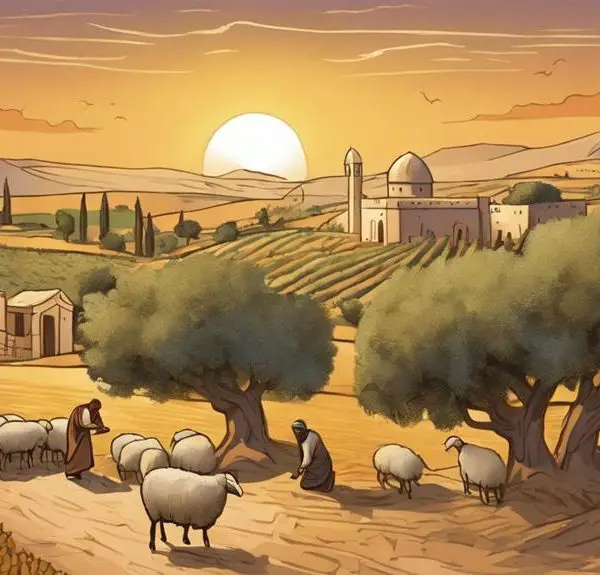
Sign up